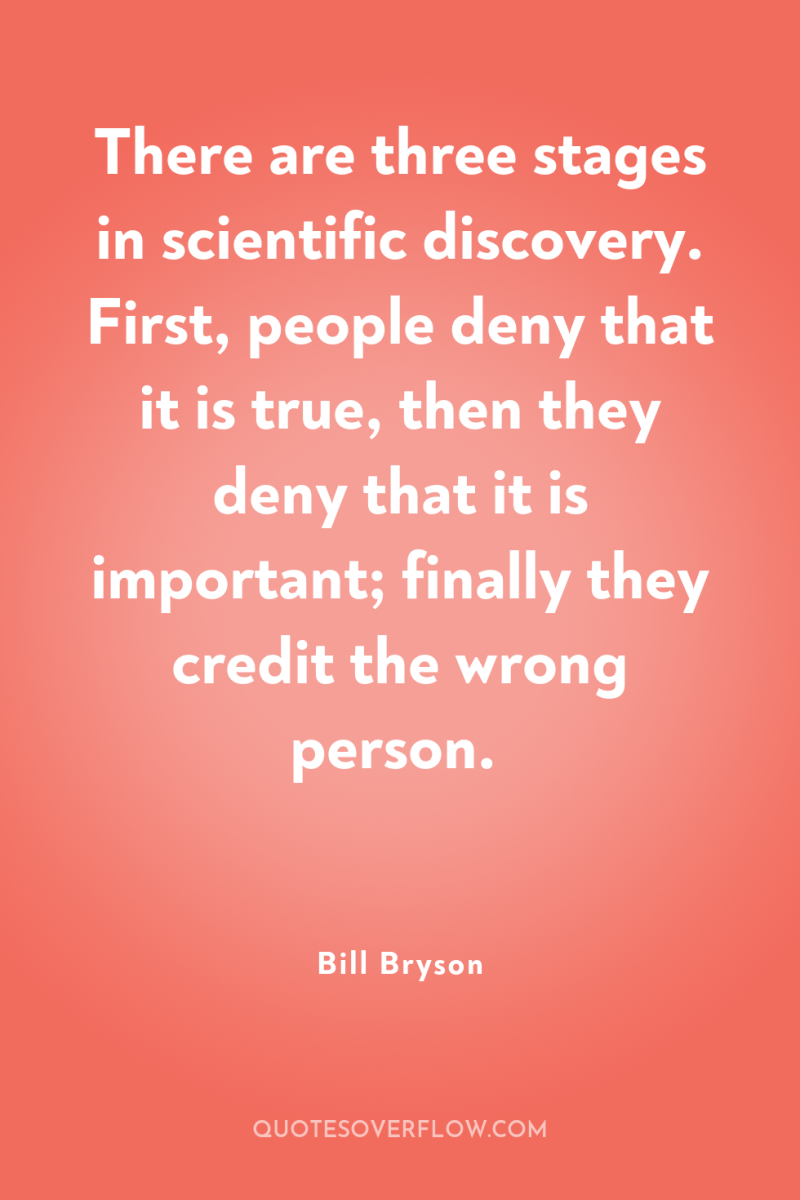1
Not one of your pertinent ancestors was squashed, devoured, drowned, starved, stranded, stuck fast, untimely wounded, or otherwise deflected from its life's quest of delivering a tiny charge of genetic material to the right partner at the right moment in order to perpetuate the only possible sequence of hereditary combinations that could result -- eventually, astoundingly, and all too briefly -- in you.Bill Bryson
2
If this book has a lesson, it is that we are awfully lucky to be here-and by 'we' I mean every living thing. To attain any kind of life in this universe of ours appears to be quite an achievement. As humans we are doubly lucky, of course: We enjoy not only the privilege of existence but also the singular ability to appreciate it and even, in a multitude of ways, to make it better. It is a talent we have only barely begun to grasp. .Bill Bryson
3
When the poet Paul Valery once asked Albert Einstein if he kept a notebook to record his ideas, Einstein looked at him with mild but genuine surprise. "Oh, that's not necessary, " he replied . "It's so seldom I have one.Bill Bryson
4
We know amazingly little about what happens beneath our feet. It is fairly remarkable to think that Ford has been building cars and baseball has been playing World Series for longer than we have known that the Earth has a core. And of course the idea that the continents move about on the surface like lily pads has been common wisdom for much less than a generation. “Strange as it may seem, ” wrote Richard Feynman, “"we understand the distribution of matter in the interior of the Sun far better than we understand the interior of the Earth. .Bill Bryson
5
If you imagine the 4, 500-bilion-odd years of Earth's history compressed into a normal earthly day, then life begins very early, about 4 A.M., with the rise of the first simple, single-celled organisms, but then advances no further for the next sixteen hours. Not until almost 8:30 in the evening, with the day five-sixths over, has Earth anything to show the universe but a restless skin of microbes. Then, finally, the first sea plants appear, followed twenty minutes later by the first jellyfish and the enigmatic Ediacaran fauna first seen by Reginald Sprigg in Australia. At 9:04 P.M. trilobites swim onto the scene, followed more or less immediately by the shapely creatures of the Burgess Shale. Just before 10 P.M. plants begin to pop up on the land. Soon after, with less than two hours left in the day, the first land creatures follow. Thanks to ten minutes or so of balmy weather, by 10:24 the Earth is covered in the great carboniferous forests whose residues give us all our coal, and the first winged insects are evident. Dinosaurs plod onto the scene just before 11 P.M. and hold sway for about three-quarters of an hour. At twenty-one minutes to midnight they vanish and the age of mammals begins. Humans emerge one minute and seventeen seconds before midnight. The whole of our recorded history, on this scale, would be no more than a few seconds, a single human lifetime barely an instant. Throughout this greatly speeded-up day continents slide about and bang together at a clip that seems positively reckless. Mountains rise and melt away, ocean basins come and go, ice sheets advance and withdraw. And throughout the whole, about three times every minute, somewhere on the planet there is a flash-bulb pop of light marking the impact of a Manson-sized meteor or one even larger. It's a wonder that anything at all can survive in such a pummeled and unsettled environment. In fact, not many things do for long. .Bill Bryson

6
There are three stages in scientific discovery. First, people deny that it is true, then they deny that it is important; finally they credit the wrong person.Bill Bryson
7
It is a slightly arresting notion that if you were to pick yourself apart with tweezers, one atom at a time, you would produce a mound of fine atomic dust, none of which had ever been alive but all of which had once been you.Bill Bryson
8
It is easy to overlook this thought that life just is. As humans we are inclined to feel that life must have a point. We have plans and aspirations and desires. We want to take constant advantage of the intoxicating existence we've been endowed with. But what's life to a lichen? Yet its impulse to exist, to be , is every bit as strong as ours-arguably even stronger. If I were told that I had to spend decades being a furry growth on a rock in the woods, I believe I would lose the will to go on. Lichens don't. Like virtually all living things, they will suffer any hardship, endure any insult, for a moment's additions existence. Life, in short just wants to be.Bill Bryson
9
In France, a chemist named Pilatre de Rozier tested the flammability of hydrogen by gulping a mouthful and blowing across an open flame, proving at a stroke that hydrogen is indeed explosively combustible and that eyebrows are not necessarily a permanent feature of one's face.Bill Bryson

10
Energy is liberated matter, matter is energy waiting to happen.Bill Bryson

11
Consider the Lichen. Lichens are just about the hardiest visible organisms on Earth, but the least ambitious.Bill Bryson
12
As we parted at the Natural History Museum in London, I asked Richard Fortey how science ensures that when one person goes there's someone ready to take his place. He chuckled rather heartily at my naiveté. 'I'm afraid it's not as if we have substitutes sitting on the bench somewhere waiting to be called in to play. When a specialist retires or, even more unfortunately, dies, that can bring a stop to things in that field, sometimes for a very long while.' And I suppose that's why you value someone who spends forty-two years studying a single species of plant, even if it doesn't produce anything terribly new?'' Precisely, ' he said, 'precisely.' And he really seemed to mean it. .Bill Bryson
13
This is a world where things move at their own pace, including a tiny lift Fortey and I shared with a scholarly looking elderly man with whom Fortey chatted genially and familiarly as we proceeded upwards at about the rate that sediments are laid down. When the man departed, Fortey said to me: "That was a very nice chap named Norman who's spent forty-two years studying one species of plant, St. John's wort. He retired in 1989, but he still comes in every week."" How do you spend forty-two years on one species of plant?" I asked." It's remarkable, isn't it?" Fortey agreed. He thought for a moment. "He's very thorough apparently." The lift door opened to reveal a bricked over opening. Fortey looked confounded. "That's very strange, " he said. "That used to be Botany back there." He punched a button for another floor, and we found our way at length to Botany by means of back staircases and discreet trespass through yet more departments where investigators toiled lovingly over once-living objects.Bill Bryson
14
Bipedalism is a demanding and risky strategy. It means refashioning the pelvis into a full load-bearing instrument. To preserve the required strength, the birth canal in the female must be comparatively narrow. This has two very significant immediate consequences and one longer-term one. First, it means a lot of pain for any birthing mother and greatly increased danger of fatality to mother and baby both. Moreover, to get the baby's head through such a tight space it must be born while it's brain is still small - and while the baby, therefore, is still helpless. This means long-term infant care, which in turn implies solid male-female bonding. .Bill Bryson

15
The universe is an amazingly fickle and eventful place, and our existence within is a wonder.Bill Bryson
16
Disassemble the cells of a sponge (by passing them through a sieve, for instance), then dump them into a solution, and they will find their way back together and build themselves into a sponge again. You can do this to them over and over, and they will doggedly reassemble because, like you and me and every other living thing, they have one overwhelming impulse: to continue to be.Bill Bryson
17
On a cooler sun on a primordial earth: "I later learned that biologists, when they are feeling jocose, refer to this as the 'Chinese Resaturant Problem'--because we has a dim sun.Bill Bryson
18
Tune your television to any channel it doesn't receive and about 1 percent of the dancing static you see is accounted for by this ancient remnant of the Big Bang. The next time you complain that there is nothing on, remember that you can always watch the birth of the universe.Bill Bryson
19
It seems impossible that you could get something from nothing, but the fact that once there was nothing and now there is a universe is evident proof that you can.Bill Bryson
20
When you consider it from a human perspective, and clearly it would be difficult for us to do otherwise, life is an odd thing. It couldn't wait to get going, but then, having gotten going, it seemed in very little hurry to move on.Bill Bryson
21
The Moon is slipping from our grasp at a rate of about 1.5 inches a year. In another two billion years it will have receded so far that it won’t keep us steady and we will have to come up with some other solution, but in the meantime you should think of it as much more than just a pleasant feature in the night sky.Bill Bryson
22
Imagine trying to live in a world dominated by dihydrogen oxide, a compound that has no taste or smell and is so variable in its properties that it is generally benign but at other times swiftly lethal. Depending on its state, it can scald you or freeze you. In the presence of certain organic molecules it can form carbonic acids so nasty that they can strip the leaves from trees and eat the faces off statuary. In bulk, when agitated, it can strike with a fury that no human edifice could withstand. Even for those who have learned to live with it, it is an often murderous substance. We call it water.Bill Bryson
23
Worse still, it isn’t actually necessary to look to space for petrifying danger. As we are about to see, Earth can provide plenty of danger of its own.Bill Bryson
24
In terms of adaptability, humans are pretty amazingly useless.Bill Bryson
25
You may not feel outstandingly robust, but if you are an average-sized adult you will contain within your modest frame no less than 7 X 10^18 joules of potential energy–enough to explode with the force of thirty very large hydrogen bombs, assuming you knew how to liberate it and really wished to make a point.Bill Bryson
26
Our instinct may be to see the impossibility of tracking everything down as frustrating, dispiriting, perhaps even appalling, but it can just as well be viewed as almost unbearably exciting. We live on a planet that has a more or less infinite capacity to surprise. What reasoning person could possibly want it any other way?Bill Bryson
27
For the moment we might very well can them DUNNOS (for Dark Unknown Nonreflective Nondetectable Objects Somewhere).Bill Bryson
28
As humans we are inclined to feel that life must have a point. We have plans and aspirations and desires. We want to take constant advantage of all the intoxicating existence we've been endowed with. But what's life to a cell? Yet it's impulse to exist, to be, is every bit as strong as ours - perhaps even stronger. Life just wants to be.Bill Bryson
29
Physics is really nothing more than a search for ultimate simplicity, but so far all we have is a kind of elegant messiness.Bill Bryson
30
As the physicist Paul Davies puts it, 'If everything needs everything else, how did the communities of molecules ever arise in the first place?' It is rather as if all the ingredients in your kitchen somehow got together and baked themselves into a cake - but a cake that could moreover divide when necessary to produce more cakes. It is little wonder that we call it the miracle of life. It is also little wonder that we have barely begun to understand it.Bill Bryson